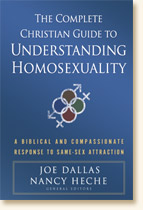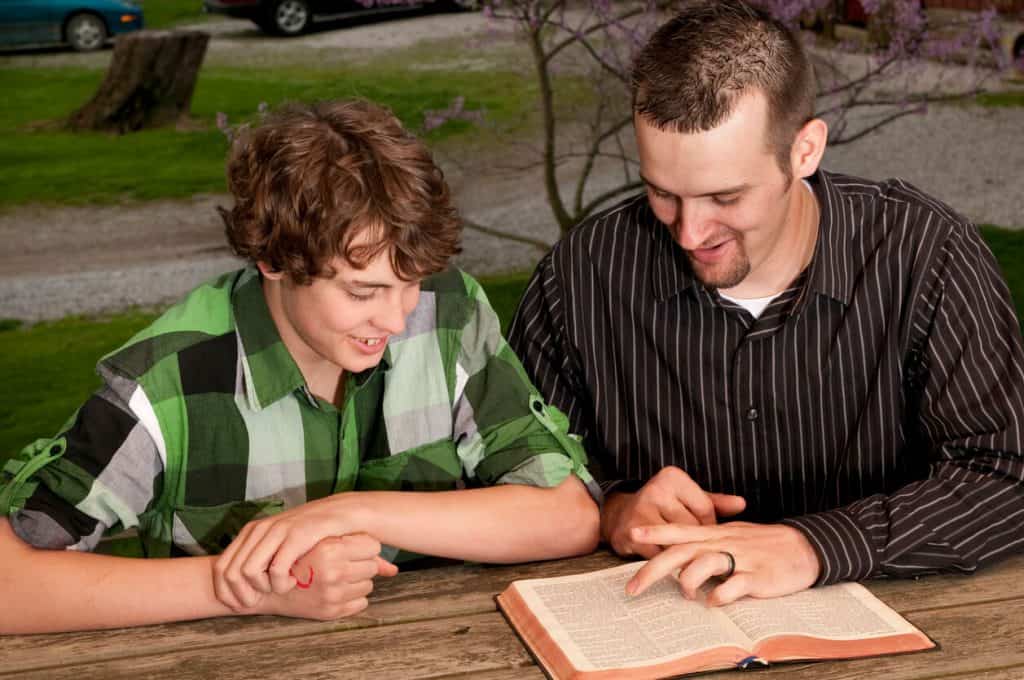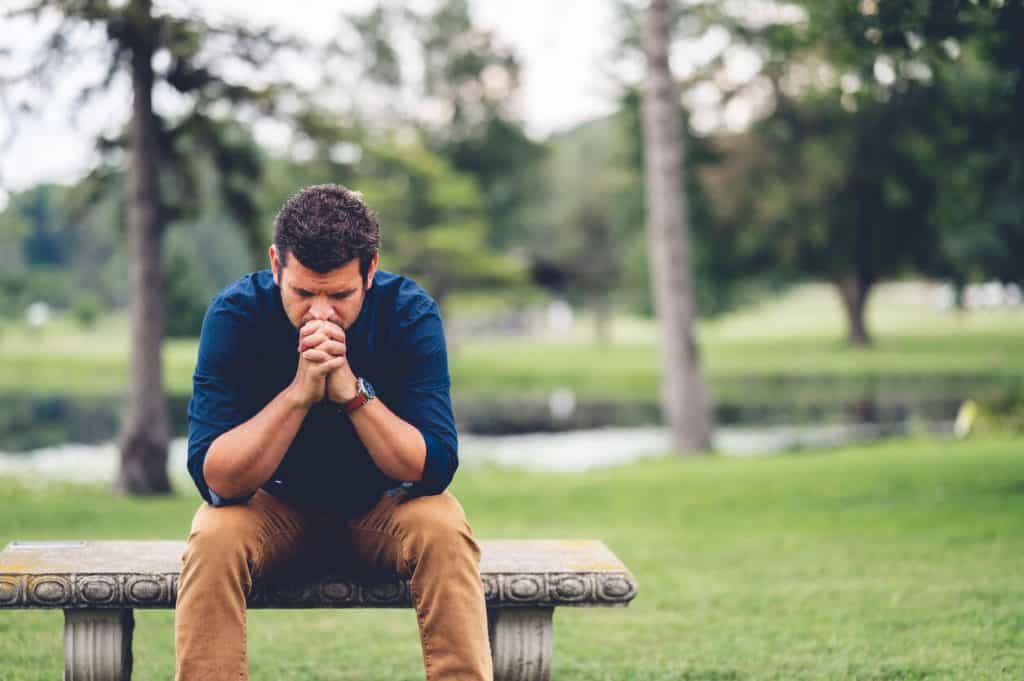Read Part 1
“When we want to be something other than the thing God wants us to be, we must be wanting what, in fact, will not make us happy.” -CS Lewis
It took less than 60 minutes for me to convince myself that God and gay were compatible. It would be another six years before I reconsidered the gay gospel, and what kind of life I’d made for myself by accepting it.
At first, back in 1978, it had been exhilarating. After all, up to that point two of the most potent forces in my life—my spirituality and my sexuality—had been at war. I’d tried to kill one in the interest of the other, with miserable results. Now they were co-existing peacefully, or so I thought, and would continue to think for years. So initially, my decision to step into the aisle of the gay church was followed by relief and excitement: relief because the battle between gay and God was resolved, and excitement at the prospect of a new church, new identity, new everything.
Why the Gay Gospel?
Over the years, I’ve been repeatedly asked how, as a born-again Christian from a Christ-centered church, I could have been so deceived as to believe and promote the “gay gospel.” I can’t speak for others who’ve been in the same position, but in my case, the recipe was pretty simple. I had a long-standing problem—sexual attractions towards the same gender—that I had neither created nor chosen. But once I discovered it, I did make a series of wrong choices that set me up for deception.
The first wrong choice lay in keeping my sexual struggles a secret, refusing to bring them into the light of accountability, counsel, and prayer support, where they belonged. That alone would have spared me years of error and moral tragedy. I followed that decision with an even worse one, by finally indulging the desires I’d pushed down for so long. That led to a general hardening of my heart towards God and an increasingly darkened mind. And that, inevitably, led me to say “yes” to the seduction of pro-gay theology, and to the cementing of a deception that would last too long and cost me far too much. But the deception wasn’t something that mugged me while I was innocently walking down the street. I set myself up for it, willfully and quite stupidly. Rebellion is, after all, no accident, and the rebel is no victim.
Within a year, I’d accepted a post as the church’s pianist, and had entered a two-year training program for acceptance onto their ministerial staff. And over the next four years, I regularly taught Bible studies, preached sermons, and, in time, began counseling men and women who visited the church, wondering what to do with their sexuality. I did my best to persuade them that the answer to their conflict lay in accepting the claims of the gay gospel, and remembering that will always provoke an ache in my heart.
I also tried, with limited success, to squash whatever conscience pangs I still had over the question I’d considered back in 1978, when I first joined the gay church: What about the Bible?
I’d adopted the pro-gay theology by then, and could hold my own when defending it. But articulating an argument is one thing; being personally convinced of it is another. And at times I wondered, very uncomfortably, if I really was convinced that pro-gay theology was true, or just doing a darned good job pretending to be convinced.
Occasionally a Christian friend from my old days would write, call, or even confront me face to face. Word had gotten out, of course, that Joe Dallas had gone gay, and many of my former acquaintances had to have been shocked and appalled. Some tried to get through to me, and to this day I’m sure they’ve no idea how much impact they had, nor what doubt they stirred in me. Not that I would admit it at the time—I made it a point to keep my bravado intact as I explained why I believed what I believed, and how wrong they were to challenge me. But afterward when I was alone, apart from the need to put the best face possible on my “gay Christian” persona, I’d be plunged into inconvenient, piercing doubts. Sometimes I’d talk myself out of them by parroting the revisionists lines. Other times, when logic and pro-gay theology weren’t getting along in my mind, I’d silence the argument with a six-pack, hoping to put the matter behind me in the morning.
But only so many mornings can pass before your doubts won’t be gagged any longer, so by the early part of 1984, mine spoke up.
Nagging Doubts
At the oddest hours—midday at work, for example, or early in the morning—I’d feel a cold, lonely pain in my gut that was hard to identify. It wasn’t a longing for a lover or friend, as I had plenty of company but no desire to try yet another “relationship.” It was a longing for something, though—something ill defined and just out of reach. And this uneasy, depressing thing festered and persisted, sometimes to the point of drawing tears.
Whatever it was, it was becoming downright scary, especially because I saw nothing in my life warranting it. I was in excellent shape, having taken up bodybuilding with a vengeance, and was reasonably popular and sought out. My finances were in order, as was, indeed, every other part of my life. I’d taken enough coursework to become a therapist shortly, and was looking forward to getting an internship. Good friends, great health, career goals and financial security—“so what’s not to be happy about?” I’d ask myself whenever “it” reared its head. But during the holiday season of 1983 and early 1984, while my undiagnosed emotional pain got worse and worse, its source was elusive.
It remained so until what started as an uneventful weeknight became a turning point. I’d gone straight to the gym after work, as usual, then trained, showered, grabbed a quick dinner and headed home. It was nearing 8 p.m. by then and, being an early riser, that’s when I preferred being indoors on weeknights. Parties were for weekends; work and studying took precedence Monday through Thursday.
“But tonight’s for relaxing,” I remember telling myself, as there was no upcoming test to prep for and no papers to write. So I grabbed a Bud Lite, plopped myself onto the couch, shucked my wingtips off and clicked the remote. When the screen lit up, my mouth dropped, then broadened into a grin.
There, on the Christian station I’d happened to tune into, was an old friend from my early ministerial days. He’d been one of the most well-known and widely respected Christian musicians of the 1970s, and, in fact, continues to have a thriving music ministry even now. But that night it was himself, not his music, that he was discussing on this talk show. Not just himself, in fact, but his problems as well, problems I’d never known him to have.
He openly described, to my astonishment, his alcoholism. It had dogged him for years, disrupting his ministry and marriage, nearly costing him both. Now he’d been sober for some time, and was encouraging viewers to admit whatever secrets they struggled with, bring them into the light, and deal with them openly the way he’d finally had to admit and deal with his. It was possible, he said, for a Christian to have an ongoing sin in his life that he feels terrified to let anyone know about. But whatever difficulties might come as a result of finally admitting the problem paled, he said, when compared to the nightmare you could make of your life by not dealing with it.
Click.
I’d turned the TV off without realizing it, and was staring into space, stunned not so much by my old friend’s testimony, but by the thought it was bringing up in me.
The nightmare you could make of your life—the nightmare you have made of your life…
“Wait a minute!” I shouted at no one in particular. “My life’s no nightmare.” Then I reeled off, one by one, the reasons I was a success by any standard. All of them were valid; none were arguable. So there, case closed. Have another beer.
And yet—no. The case had been re-opened, I knew, skipping the beer and sitting back down.
My old friend had a secret problem, I reflected, just as I’d had six years earlier. But unlike me, he’d dealt with his by calling it what it was, rather than by re-defining it. And he’d done so openly, in the church, without running away. I, on the other hand, had dealt with my problem by deciding to indulge it, then trying to make peace with it by re-defining it, then running away from anyone who challenged that re-definition. And if I’d really been sure I was right, why did I run from anyone (or any thought, for that matter) that challenged me?
The Big Question
After another 30 minutes of silent reflection, it boiled down to this: A life not lived with a clear conscience and a satisfied mind becomes its own nightmare, the very nightmare my old friend was warning against. And that, in a nutshell, was the “it” that had haunted me for months. I simply wasn’t sure anymore—nor, perhaps, had I ever been sure—that I was right about God, or my way of life. And those, I admitted bleakly, were two things a man had better be sure of.
But what, I wondered, was making me so unsure of both?
The answer flew at my face like a basketball held underwater for too long: The Big Question, that’s what. The hard one; the one I’d crammed into the back file for too long. Time to pull it out, with the lights turned on and no wishful thinking. My old friend had done it; couldn’t I?
I looked around my apartment’s living room—piano, bookcase, entertainment center, plants, mirrors and stereo—with a strange certainty that I was about to raise issues that would forever change everything. So I quietly said goodbye to my surroundings, knowing that what I was about to ask myself would drive a stake through the heart of my life as I knew it.
The stake was a question, and the question was simple: When I embraced the “gay and Christian” identity, was that a decision based on the belief this was God’s will for my life, or on the hope that this was what God might allow?
Plain question; enormous implications. I remembered, such a thing as “cheap grace”—a willingness to be forgiven, but not obedient. Scripture, church history and modern experience are rife with examples. There were believers, and there were disciples. And wasn’t one of the Church’s greatest tragedies the number of people who chose to be one instead of both?
My house of cards was caving in, blown out by the first honest look at myself since I’d erected it.
All this time I’d contented myself with some facts I knew to be true, using them to obscure other equally important ones. God loved me, no question. I had been born again, grounded in the Word, and established in a life that did, in many ways, testify to my faith. I made no bones about my belief in Christ when I was on the job, often referring to myself as a church-going Christian. I read the Bible, sometimes daily, sometimes not, but regularly nonetheless. I had a prayer life, and was certain I sensed God’s presence, especially during worship or private devotions. These were facts, and they spoke loudly.
So loudly they had helped me ignore the quieter, inconvenient ones; the ones that emerged now, dusting themselves off so I could give them a fresh look.
Fact: Anyone can pray, read the Word and call himself a Christian. Satan himself quoted scripture to Christ, atheists pray under stress, and Christians can be carnal, deceived, wrong. The habit of reading the Bible, no matter how fervently, doesn’t guarantee one’s life is in line with it. It’s the doers, not the hearers, who live in God’s favor. Maybe I’d never “lost my salvation”; maybe God’s Spirit still dwelt within me; maybe at times He even blessed or provided for me. So what? To call Him Savior at all times but Lord at most times is the lot of the lukewarm or the deluded.
Fact: God never held my sexual orientation against me. But where did I get the idea He created it? I’d always known sin nature expressed itself differently from person to person. Sometimes it showed itself in common ways; other times, it manifests through uncommon, even unnatural desires. Regardless of what created those desires, I was expected, like all believers, to ask myself not whether my feelings seemed natural to me, but what He expected me to do with them. Instead, I’d decided for myself what was right, usurping the Creator’s privilege and making it my own.
And there it was in plain, ugly view. Exhibit A, the most damming evidence against me. I’d removed myself from God’s authority, then made a god of Joe Dallas. And like all fools trying to play god, I’d been wrong.
Wrong when I’d stepped into the aisle, taking communion as a gay Christian. Wrong when I’d encouraged others to do the same, wrong when I’d spoken to college campuses as a “proud, gay Christian,” eagerly taking on the students who thought homosexuality was sick, shooting down arguments from well-intentioned but poorly informed Christians.
And wrong—God help me, so wrong!—when entering into relationship after relationship, trying time and again to form partnerships that would inevitably fail.
I’ve no idea how much time had passed by then. It was dark and quiet; the silence made it easier to finally say what had to be said, boldly and finally.
“I’ve been wrong for years, and there’s nothing I can do to atone—nothing I can do at all but face it and weep.”
So I did, sobbing bitterly into the early morning hours, then praying the only appropriate words—God be merciful to me a sinner!—before finally slipping into the deepest, fullest sleep I’d enjoyed in years.
I began packing the next morning.
Weeping Over the Gay Community
Twenty-six years have passed between then and the time of this writing, years of new relationships, situations and privileges unthinkable that dark winter night I repented. I’ve enjoyed a 19-year marriage to an extraordinary woman who still reduces me to the awkwardness of a love-struck kid; I’ve fathered two sons who own my heart; I’ve had the honor of authoring five books, and the joy of full-time ministry. I am a prodigal returned, forgiven, and restored, and I’ve got a satisfied mind.
But it’s a troubled one, too. How could it not be? The state of both the church and the nation should trouble us, and our concern needs to be translated into constructive, redemptive action.
In Ephesians 2:10, Paul referred to the church as God’s “workmanship,” the Greek word for which is poema, from which we get our word “poem.” I love this concept, sobering as it is. God’s the poet; we’re the poem—His earthly work of art; His visible representatives. That puts both tremendous honor and responsibility on us because, as His workmanship, we’ve been commissioned to represent Him accurately. John said as much himself, when he reminded his readers:
“He who says he abides in Him ought so to walk as He walked” (1 John 2:6).
And when describing how He walked, John mentions two of Jesus’ most noticeable qualities:
“—and we beheld His glory, the glory as of the only begotten of the Father, full of grace and truth.” (John 1: 14)
To represent Him properly, then, is to exhibit grace and truth. And on no issue are we more challenged to express both than on this one.
Jesus wept openly over Jerusalem, knowing all it could have been yet foreseeing its doom. Paul’s heart’s desire was to see the Jews (who at times opposed him violently) saved. But today, who weeps for homosexuals; whose heart cries out to see them brought to the truth? A lack of impassioned, Christ-like tears may be a measure of our compromised grace.
But a compromise of truth is no less atrocious. Jesus refused to soft-pedal truth for the sake of grace when referencing sexual immorality. So when extending grace to an adulteress, He also called her behavior a sin (John 8: 11). His Sermon on the Mount, an epic model of grace, also includes one of the most stringent standards for sexual purity in scripture (“Whoever looks upon a woman to lust after her has committed adultery in his heart,” Matthew 5:28). He categorized adultery, fornication and lewdness alongside blasphemy and murder (Mark 7: 21) and when rebuke was called for, whether towards his adversaries or disciples, He never withheld it (see Matthew 23, or Matthew 16:23, for example). To walk as He walked, then, is to be as unsparing of the truth as we are of grace.
Believe me, few people recognize their need for salvation by being told how likable they are, nor are people born again by being made comfortable in their sin. Perhaps one of the greatest errors infecting modern Christian thought is the presumption that if people like us, then we’ve reached them. Yet Titus Brandsma, a Christian martyr who died at Dachau in 1942, had a more Biblical perspective on the matter:
“Those who want to win the world for Jesus Christ must have the courage to come into conflict with it.”
To those for whom sensitivity takes precedence over truth, we’d respond with: Comfort is fine, so long as you don’t make people comfortable at the expense of telling them the truth about their condition. And if popularity and a large congregation mean more to you than sound doctrine, then drop the ministry and go into politics. A preacher’s calling is to give the full counsel of God, not to make friends.
Ultimately, then, the church’s ability to withstand the gay religious movement will be determined by our willingness to be inconvenienced. It will be inconvenient to study pro-gay theology and learn how to refute it. It will certainly be inconvenient to train up Christian spokesmen to stand for truth in our campuses, television studios, and sanctuaries. Establishing ministries in our churches to repentant homosexuals will be inconvenient and controversial. And getting involved with them, through one-on-one discipleship and relating, will no doubt be a major inconvenience as well.
Yet nothing less will stem the tide of pro-gay theology. And should we refuse to be inconvenienced, and let the tide wash over us, for whom but ourselves do we think the bell is going to toll?
I was fortunate. Loving friends took me in when I repented. Strong brothers welcomed me into their fellowship. I was forgiven, accepted, and restored. I could only wish the same for every woman or man who, by God’s grace, is also brought beyond delusion. And perhaps, with an awakening among Christians to our need for each other no matter what our background or former sins, more prodigals will find a celebration waiting for them when they, too, return to their father’s house.
It is not a pipe dream. Episcopal seminarian William Frey envisioned it some time ago, and, as he relates it, it sounds like nothing more than basic Christianity:
“One of the most attractive features of the early Christian communities was their radical sexual ethic and their deep commitment to family values. These things drew many people to them who were disillusioned by the promiscuous excesses of what proved to be a declining culture. Wouldn’t it be wonderful for our church to find such counter-cultural courage today?”
Wonderful indeed.
Wonderful, admirable, and—most important—entirely possible.
. . . .
 Joe Dallas’ new book The Complete Christian Guide to Understanding Homosexuality has just been released through Harvest House publishers . It’s a comprehensive look at the issue from all sides—same sex marriage, counseling the homosexual, refuting pro-gay theology, dealing with gay loved ones, witnessing to homosexuals, and more. To order, or for more information, click here.
Joe Dallas’ new book The Complete Christian Guide to Understanding Homosexuality has just been released through Harvest House publishers . It’s a comprehensive look at the issue from all sides—same sex marriage, counseling the homosexual, refuting pro-gay theology, dealing with gay loved ones, witnessing to homosexuals, and more. To order, or for more information, click here.







So much truth! I see myself in this. Glory be to God through his Son Jesus Christ for rescuing me!
Thankyou for sharing – just read a article by a blogger sharing his views and his reading of the Bible’s meaning in original language. Would love to see some interactive dialogue with him, he has strong views about Exodus International but your personal testimony is so powerful.
http://groupsects.wordpress.com/2010/08/03/the-official-official-groupsects-position-on-the-gay-thing/
This is SUCH a good article, full of so many nuggets of truth that we can all relate to.